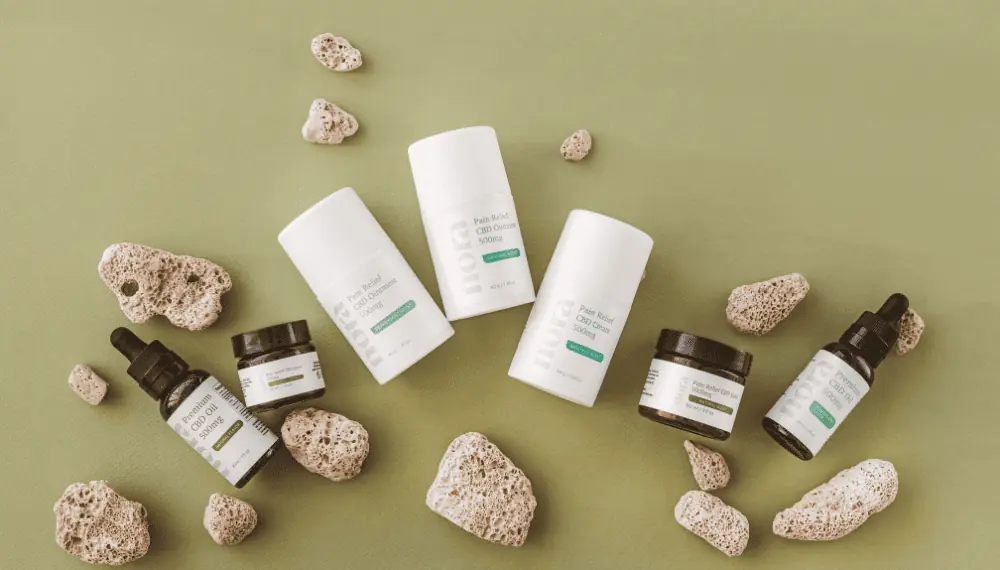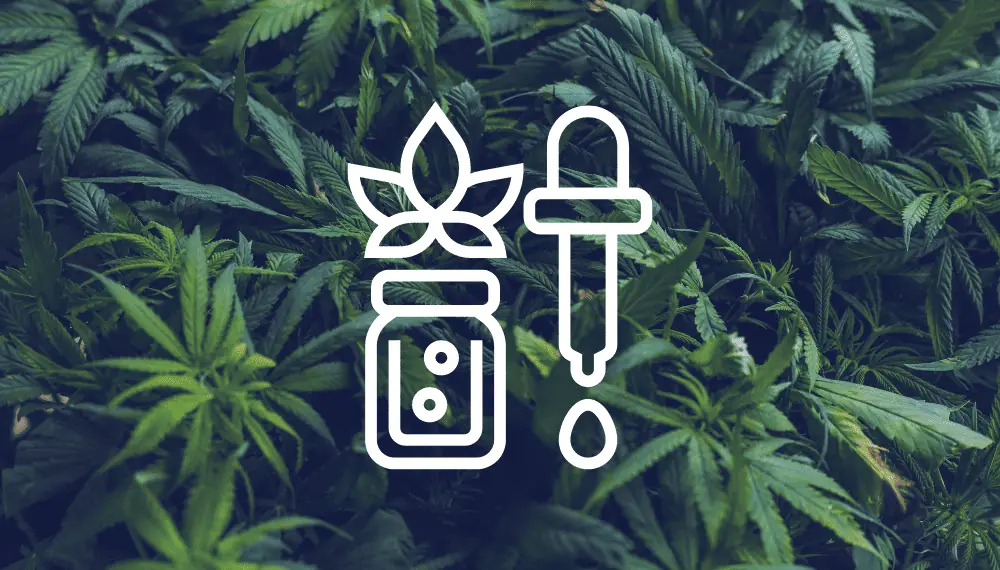The CBD industry is growing rapidly and is expected to be worth an enormous 22 billion dollars by 2030. This has made business owners interested in using Facebook to advertise and sell CBD products. In this article we will understand if you can advertise and sell CBD on Facebook in 2023.
But it’s not that simple because there are many complicated rules about CBD set by the government and each state. Facebook’s parent company, Meta, also has its own rules for advertising, and they can be confusing too. Even though Meta became a bit more flexible about CBD ads in 2021, there are still some strict rules that haven’t changed yet.
So, the big question is: Will it be possible to advertise and sell CBD on Facebook in 2023? We want to find out the answer and also understand how the CBD market is changing and what challenges and opportunities might be ahead for businesses who want to try selling CBD on social media.

CBD Market From 2021 To 2026: Source Statista
What are CBD Products?
CBD products are a type of health and wellness products that contain cannabidiol, commonly known as CBD. The cannabis plant contains the naturally occurring substance cannabidiol. CBD doesn’t cause a “high” like its cousin THC (tetrahydrocannabinol) does. Instead, it is thought to have a number of possible health advantages without having any psychoactive side effects.

CBD products come in various forms, including oils, tinctures, capsules, gummies, creams, and even beverages. People use these products for a wide range of reasons, such as to manage stress, promote relaxation, alleviate pain, improve sleep, and support overall well-being. The popularity of CBD has surged in recent years, partly due to growing interest in alternative and natural remedies.
It’s essential to note that the regulation of CBD products can vary by country and state, leading to a sometimes-confusing landscape for consumers and businesses. Consequently, it’s crucial to research and purchase CBD products from reputable and transparent sources to ensure their quality and safety.
![]() Recommended Reading: Kratom vs CBD vs Kava
Recommended Reading: Kratom vs CBD vs Kava
Facebook Policy: Can You Advertise And Sell CBD on Facebook in 2023?

In the ever-changing digital marketing landscape, Facebook plays a prominent role as one of the most influential advertising platforms worldwide. However, when it comes to advertising CBD products, businesses need to be aware of Facebook’s strict policies and limitations. Understanding these policies is crucial to avoid potential penalties or the rejection of ad campaigns.
Prohibited CBD Product Advertising
Facebook’s advertising policy explicitly prohibits the promotion or sale of cannabidiol (CBD) and other similar ingestible or non-ingestible cannabinoids, such as cannabigerol (CBG). Furthermore, ingestible and non-ingestible products containing psychoactive tetrahydrocannabinol (THC) or any cannabis-related item with psychoactive components are severely prohibited.
Health Claims and Medical Implications
Any form of CBD or THC-related advertising on Facebook must avoid making explicit health claims or suggesting that these substances can cure, treat, prevent, or diagnose any medical conditions in humans or animals. Such medical claims are against Facebook’s advertising policies and can lead to ad disapproval or account suspension.
Permissible Advertising
While CBD and THC products are heavily restricted, Facebook does allow the promotion of hemp seed, hemp, and hemp fiber, provided they do not contain CBD or have THC levels above 0.3%. This allowance is due to the distinction between hemp-derived products that contain negligible THC and CBD, which are federally legal in some regions.
Educational and Advocacy Content
Businesses and organizations are permitted to create educational and advocacy advertisements related to hemp and related products, including CBD, as long as these ads do not involve the sale or promotion of prohibited products. This means that you can raise awareness about hemp’s benefits, its uses, or its potential environmental impact without violating Facebook’s policies.
In summary, Facebook’s advertising policy regarding CBD products is quite restrictive. While they allow certain educational and advocacy content surrounding hemp, businesses cannot directly promote or sell CBD or any other prohibited cannabinoids.
As the legal and regulatory landscape surrounding CBD is constantly evolving, it is essential for advertisers to stay informed about any policy changes on the platform to ensure compliance and a successful advertising campaign.
Can You Advertise CBD on Facebook?

While direct advertising of CBD products on Facebook is not currently permitted, businesses can still find creative ways to promote their hemp-related offerings. By focusing on topicals and hemp-only products and leveraging SEO content strategies, companies can reach their target audience and showcase the versatility and benefits of hemp-derived products within the confines of Facebook’s advertising policies.
It’s essential to stay updated on any changes to Facebook’s guidelines and comply with local regulations when marketing CBD products on the platform.
Here are some effective ways to advertise CBD in 2023:
Focus on Topicals and Hemp-Only Products
While promoting ingestible CBD products is not allowed, businesses can still explore advertising opportunities for topical CBD products. This includes CBD-infused creams, lotions, and skincare products that are primarily hemp-based. By positioning these products as hemp-only rather than CBD-specific, businesses can potentially navigate Facebook’s advertising restrictions.
Invest in SEO Content
Since direct advertising is restricted, investing in Search Engine Optimization (SEO) content could be a viable option for businesses in the CBD industry. By creating informative and engaging content around hemp-related products, such as hemp clothing, ropes, food made from hemp seeds (raw hemp hearts, cooking oils, and hemp seed milk), and skincare with hemp seed oil, businesses could attract organic traffic to their websites.
Because they are sustainable and favorable to the environment, hemp products are becoming more popular. Hemp-based clothing and textiles provide a robust and sustainable substitute for conventional fabrics. Foods made from hemp seeds, such as raw hemp hearts and cooking oils, have gained recognition for their high nutritional value due to their abundance in beneficial fatty acids and protein. Hemp seed oil is also valued for its moisturizing qualities and potential skincare advantages in skincare products.
How to Run CBD Ads on Facebook
Running CBD ads on Facebook requires navigating the platform’s strict policies and guidelines surrounding CBD and cannabis-related products. While direct promotion of CBD products is not allowed, there are some strategies you can employ to promote your CBD business on Facebook while staying compliant.
Creating eCommerce Business Landing Page
Consider setting up a unique eCommerce landing page on Facebook in order to conduct CBD adverts. You should refrain from employing domain words like “CBD” and “cannabidiol” on this page, nor should it have cross links to your main website. Instead, concentrate on legal hemp seed oil, topicals, and other products made from hemp.
Avoid Direct Links to Products
On the landing page, refrain from directly linking to specific CBD products. Instead, keep the content informational and educational, providing insights into the benefits of hemp-based products without explicitly promoting individual items.
Steer Clear of Health Claims
While creating content for the landing page, don’t make any health claims without citing scientific studies or official sources. Facebook strictly prohibits advertisers from making unsubstantiated health claims about CBD products.
Submitting Your Ad for Approval
Once your eCommerce business landing page is ready, create your ad and submit it to Facebook for approval. It’s important to follow the platform’s advertising policies carefully to increase the chances of approval.
Seek a Second Review if Necessary
If your ad is rejected, don’t lose hope. Request a second review and ensure that your ad complies with all guidelines. Sometimes, a minor adjustment can make a significant difference in getting your ad approved.
Utilize Influencer Marketing
Consider leveraging influencer marketing to reach a broader audience. Partner with influencers who align with your brand and have a substantial following in the health and wellness niche. Influencers can share their experiences with your hemp-based products in a compliant manner, providing valuable exposure for your business.
Remember that advertising policies and guidelines on social media platforms like Facebook can change, so stay informed about any updates to ensure ongoing compliance. Always prioritize transparency and accuracy in your CBD promotions and focus on educating your audience about the benefits of hemp-derived products.
Can You Sell CBD Oil & CBD Products on Facebook
Selling CBD oil and other CBD products directly on Facebook’s platform is not allowed due to the platform’s strict policies. However, there are methods you may employ to increase traffic to your website, where you can lawfully sell CBD oil. The following will show you how to advertise your CBD products on Facebook without breaking their rules.
Utilize a Facebook Business Page
Create a Facebook business page for your CBD business. Ensure that your page doesn’t contain any references to CBD oil or other ingestible CBD products. Instead, focus on promoting topical CBD or hemp products, such as CBD-infused creams, lotions, and skincare items.
Drive Traffic to Your Website
On your Facebook business page, use compelling content and engaging posts to attract followers and drive traffic to your website. The content can include information about the benefits of using CBD topicals and how they can enhance skincare routines or promote relaxation.
Creating eCommerce Store
Set up a separate eCommerce store on your website where you can sell CBD oil and other ingestible CBD products. Make sure your eCommerce store is free from any explicit references to CBD in its domain name or content.
Showcase Your Business
Use your website to showcase information about your CBD business, including your company’s story, high-quality photos and videos of your products, and your unique branding.
Comply with Facebook’s Policies
Always adhere to Facebook’s advertising policies and guidelines. Avoid making health claims without scientific evidence, and don’t promote any ingestible CBD products on your Facebook page.
By following these steps, you can leverage your Facebook business page to drive traffic to your CBD eCommerce store and attract potential customers. Remember to prioritize transparency and compliance with regulations while promoting your CBD products, both on Facebook and your website.
Alternative Methods to Market Your CBD Business
When it comes to promoting your CBD business, especially considering the restrictions on advertising CBD products on major platforms like Facebook, it’s essential to explore alternative marketing methods to reach your target audience effectively. Here are some creative and compliant approaches to consider for your CBD business:
Influencer Marketing
Leverage the power of social media influencers who align with your brand and have a significant following in the health and wellness niche. Partner with influencers who can authentically promote your CBD products, share their experiences and educate their audience about the benefits of CBD. Influencers can provide valuable exposure and credibility to your brand, helping you reach a wider audience.
Content Marketing
Invest in content marketing by creating informative and valuable content related to CBD and hemp-derived products. Start a blog on your website where you can publish articles, guides, and educational content about CBD’s potential benefits, usage, and industry trends. Content marketing not only helps with SEO and organic traffic but also establishes your brand as an authority in the CBD space.
Email Marketing
Build an email list of interested customers and potential clients who have opted in to receive updates from your CBD business. Utilize email marketing to share product launches, exclusive offers, and educational content. Email marketing allows you to engage directly with your audience, fostering a loyal customer base.
Search Engine Optimization (SEO)
Invest in optimizing your website for search engines. With proper keyword research and SEO practices, you can improve your website’s ranking on search engine results pages. When potential customers search for CBD products online, they are more likely to find your website if it ranks higher in search results.
Affiliate Marketing
Consider setting up an affiliate marketing program where you collaborate with affiliates who promote your CBD products on their platforms. Affiliates earn a commission for each sale generated through their unique referral links. This approach can help you expand your reach and tap into new markets through the networks of your affiliates.
Social Media Engagement
While you cannot directly advertise CBD products on major platforms, you can engage with your audience on social media. Respond to comments and messages, share user-generated content, and run engaging contests or giveaways. Social media engagement helps build a community around your brand, and fosters trust and loyalty among your followers.
Local Events and Pop-Up Shops
Participate in local events, trade shows, and farmers’ markets to showcase your CBD products. Additionally, consider organizing pop-up shops in popular areas to provide in-person demonstrations and interactions with potential customers. These physical events can help create brand awareness and establish a face-to-face connection with your audience.
Influencer Takeovers and Live Streams
Collaborate with influencers for takeovers of your social media accounts or live streams. This interactive approach allows influencers to engage directly with your audience, answering questions and sharing their experiences with your CBD products.
Podcast Sponsorship
Explore opportunities to sponsor relevant podcasts in the health and wellness niche. Partnering with podcasts that share your target audience can help you reach potential customers who are interested in CBD products.
Networking with Local Health Professionals
Establish relationships with local health professionals, such as chiropractors, nutritionists, and wellness practitioners. Provide them with information about your CBD products and their potential benefits. These professionals can recommend your products to their clients, increasing brand credibility and driving more customers to your business.
Overall, while advertising CBD products on major platforms can be challenging, there are numerous alternative marketing methods to effectively promote your CBD business.
By leveraging influencer marketing, content marketing, email marketing, SEO, and other creative approaches, you can reach your target audience, build brand awareness, and foster customer loyalty in the rapidly growing CBD industry. Always prioritize compliance with regulations and transparency in your marketing efforts to establish trust and credibility with your customers.
Conclusion
In conclusion, advertising CBD products on Facebook directly is not allowed due to the platform’s strict policies. However, there are alternative ways to promote your CBD business effectively. You can create a Facebook business page to talk about topical CBD or hemp products and drive people to your website that sells CBD oil and other CBD products.
Remember to follow Facebook’s rules and avoid mentioning ingestible CBD oils on your business page. Additionally, you can explore other marketing methods like influencer marketing, content marketing, email marketing, SEO, and engaging with your audience on social media.
These creative approaches will help you reach your target audience, educate them about CBD benefits, and build a loyal customer base. Always prioritize compliance with regulations and transparency in your marketing efforts to ensure a successful and trusted CBD business.
Frequently Asked Questions (FAQs)
Is CBD legal?
Different nations and states have different laws governing CBD. CBD obtained from hemp with a very low THC level (less than 0.3%) is generally allowed, however CBD derived from marijuana may be subject to stricter regulations.
How do people use CBD?
CBD is available in a variety of forms, including capsules, oils, gummies, creams, and more. People use CBD for various reasons, such as to support relaxation, manage stress, promote better sleep, and ease discomfort.
Is CBD safe to use?
When CBD is used in the right doses, it is typically regarded as safe for the majority of people. But like any supplement, it could have negative side effects for some people, such tiredness, dry mouth, or altered appetite.
Can CBD get you high?
No, CBD does not produce a psychoactive effect or make you feel high. THC is the compound responsible for the intoxicating effects of marijuana.
Is CBD addictive?
CBD is not addictive, and there is no evidence to suggest that it leads to dependence or substance abuse.
How much CBD should I take?
Each person's recommended CBD dosage is different and is based on their body weight, personal tolerance, and intended use. Start with a little dose and gradually increase it as necessary.
Can I take CBD with other medications?
It's important to speak with a healthcare provider before using CBD, especially if you're on other medications or have underlying health conditions, as CBD may interfere with some pharmaceuticals.

